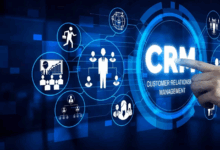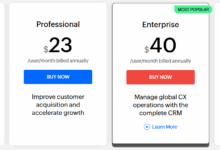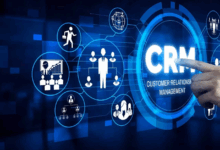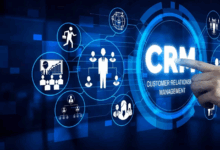Best Enterprise CRM Solutions: Streamlining Business Operations With Efficiency
Best Enterprise CRM Solutions encompass cutting-edge tools that revolutionize how businesses manage customer relationships and streamline operations. As companies strive for efficiency and growth, implementing the right CRM solution becomes paramount for success.
Overview of Enterprise CRM Solutions
Enterprise CRM Solutions are advanced software systems designed to help businesses manage their relationships with customers on a large scale. These solutions provide a centralized platform for storing customer data, tracking interactions, and analyzing customer behavior to improve overall customer satisfaction and retention.
Key Features of Enterprise CRM Solutions
- Data Analytics: Enterprise CRM Solutions utilize data analytics to provide insights into customer behavior, preferences, and trends, helping businesses make informed decisions.
- Automation Tools: These tools streamline repetitive tasks, such as email marketing, lead nurturing, and customer service, improving efficiency and productivity.
- Integrations: Enterprise CRM Solutions integrate with other business systems, such as ERP and marketing automation platforms, to create a seamless flow of information across departments.
- Reporting and Forecasting: These solutions offer robust reporting and forecasting capabilities, allowing businesses to track key metrics, identify trends, and make data-driven decisions.
Implementation of Enterprise CRM Solutions
- Implementation Steps: The implementation process involves assessing business needs, selecting the right CRM solution, customizing it to fit the business requirements, migrating data, training employees, and ongoing support and maintenance.
- Employee Training: Training employees on how to effectively use the CRM system is crucial for successful adoption and utilization, ensuring maximum benefit from the software.
- Data Migration: Data migration is a critical step in transitioning to Enterprise CRM Solutions, as businesses need to ensure the accurate transfer of data from existing systems to the new CRM platform.
- Tips for Successful Adoption: To ensure successful adoption, businesses should involve key stakeholders in the decision-making process, set clear goals, provide ongoing support and training, and regularly monitor and evaluate the system’s performance.
Comparison of Enterprise CRM Solutions
- Cloud-based vs. On-premise: Cloud-based CRM solutions offer flexibility and scalability, while on-premise solutions provide more control over data security. The choice depends on business needs and preferences.
- Scalability: Different CRM solutions vary in terms of scalability, with some offering the ability to scale up or down based on business requirements. It’s essential to choose a solution that can grow with the business.
- Cost Implications: The cost of Enterprise CRM Solutions can vary based on deployment model, features, customization, and user licenses. Businesses should consider both upfront costs and long-term ROI when choosing a CRM solution.
- Choosing the Right Solution: Businesses should consider factors such as budget, company size, industry requirements, and integration capabilities when selecting the right Enterprise CRM Solution to meet their specific needs.
Case Studies on Enterprise CRM Solutions
- Company A: Company A successfully implemented an Enterprise CRM Solution, resulting in a 20% increase in customer retention and a 15% growth in sales within the first year.
- Impact on Customer Relationships: Enterprise CRM Solutions have been instrumental in improving customer relationships by providing personalized experiences, timely responses, and targeted marketing campaigns.
- Challenges and Solutions: Businesses often face challenges during CRM implementation, such as data migration issues and resistance from employees. By providing adequate training, support, and addressing these challenges proactively, businesses can overcome them effectively.
- Metrics for Success: Key metrics used to measure the success of Enterprise CRM Solutions include customer satisfaction scores, customer retention rates, sales conversion rates, and ROI on marketing campaigns.
Comparison of Top Enterprise CRM Solutions
When it comes to choosing the best Enterprise CRM solution for your business, it’s essential to compare the top options available in the market. Each solution offers unique features, pricing models, and customer reviews that can help you make an informed decision.
Salesforce CRM
- Unique Features:
- Robust customization options
- AI-powered analytics for data-driven insights
- Integration with third-party apps
- Pricing Model:
- Offers various pricing tiers based on features and user requirements
- Subscription-based model with monthly or annual payments
- Customer Reviews:
- Rated highly for scalability and flexibility
- Positive feedback on customer support services
- Some users find the interface complex for beginners
Microsoft Dynamics 365
- Unique Features:
- Seamless integration with Microsoft Office 365
- Unified platform for sales, marketing, and customer service
- AI-driven insights for predictive analytics
- Pricing Model:
- Modular pricing structure based on specific business needs
- Option for standalone CRM or an integrated ERP solution
- Customer Reviews:
- Appreciated for user-friendly interface and ease of use
- Some users report challenges with customization options
- Positive feedback on seamless integration with other Microsoft tools
Oracle CX Cloud
- Unique Features:
- Comprehensive suite for sales, marketing, and service automation
- AI capabilities for personalized customer experiences
- Scalable architecture for large enterprises
- Pricing Model:
- Flexible pricing based on modules and user licenses
- Offers both cloud-based and on-premise deployment options
- Customer Reviews:
- Positive feedback on robust reporting and analytics features
- Some users find the initial setup process challenging
- Rated highly for customer service and support
Implementation of Enterprise CRM Solutions
Implementing an Enterprise CRM solution is a crucial process that involves several key steps to ensure successful integration and adoption within an organization. From gathering requirements to post-implementation evaluation, each phase plays a vital role in the overall effectiveness of the CRM system.
Steps in Implementing an Enterprise CRM Solution
- Requirements Gathering: This initial phase involves understanding the organization’s unique needs and objectives for implementing a CRM solution.
- Vendor Selection: Choosing the right CRM vendor that aligns with the organization’s requirements and budget is essential for a successful implementation.
- Customization and Configuration: Tailoring the CRM system to meet specific business processes and workflows is crucial for seamless integration.
- Data Migration: Transferring existing data from legacy systems to the new CRM solution requires careful planning and execution to avoid data loss or corruption.
- Training and Adoption: Providing comprehensive training programs for employees to ensure they are comfortable using the new CRM system.
- Testing and Quality Assurance: Conducting thorough testing to identify and resolve any issues before full deployment of the CRM solution.
- Phased Deployment: Rolling out the CRM system in stages to minimize disruptions and allow for feedback and adjustments along the way.
- Post-Implementation Evaluation: Continuously monitoring and evaluating the CRM system’s performance to identify areas for improvement and optimization.
Challenges in Implementation
- Resistance from Employees: Overcoming resistance to change and ensuring buy-in from employees is a common challenge during CRM implementation.
- Data Migration Issues: Data inconsistencies, duplication, and integrity issues can arise during the migration process, impacting the overall success of the implementation.
- Integration Complexities: Integrating the CRM solution with existing systems and applications can be complex and require careful planning to ensure seamless connectivity.
Tips for a Successful Implementation Process
- Effective Communication: Maintaining open and transparent communication with stakeholders throughout the implementation process is key to managing expectations and addressing concerns.
- Thorough Training Programs: Providing comprehensive training for employees at all levels to ensure they are proficient in using the CRM system.
- Phased Deployment Strategies: Implementing the CRM solution in phases allows for gradual adoption and feedback, leading to a smoother transition.
Best Practices for Integration
- Data Mapping: Ensuring proper mapping of data fields between systems to facilitate seamless data transfer and synchronization.
- API Utilization: Leveraging APIs to enable communication and data exchange between the CRM solution and other applications.
- Testing Protocols: Conducting rigorous testing to validate the integration between the CRM system and existing systems, ensuring data accuracy and consistency.
Customization Options in Enterprise CRM Solutions
Customization plays a crucial role in maximizing the efficiency and effectiveness of Enterprise CRM solutions. Businesses often have unique requirements and processes that need to be accommodated within their CRM system to ensure seamless operations and enhanced customer interactions.
Level of Customization Offered by Leading CRM Solutions
Leading CRM solutions offer a high level of customization options to meet the diverse needs of businesses. These options typically include customizable fields, workflows, dashboards, reports, and integrations with other tools.
Examples of Tailoring CRM Solutions to Specific Needs
- Creating custom fields to capture unique data points specific to the business.
- Designing personalized workflows to automate processes according to the company’s requirements.
- Developing bespoke dashboards to visualize key metrics and insights relevant to the business goals.
Importance of Customization for Optimizing CRM Performance
Customization is essential for optimizing CRM performance as it allows businesses to tailor the system to their specific needs, increasing user adoption, data accuracy, and overall productivity. By customizing the CRM solution, businesses can streamline processes, improve customer interactions, and drive better decision-making based on personalized insights.
Case Studies of Successful CRM Customization Projects
Company X saw a 20% increase in sales conversion rates after customizing their CRM to align with their unique sales process, resulting in a more targeted approach to customer engagement.
Organization Y improved customer satisfaction by 30% by customizing their CRM to track customer preferences and personalize interactions, leading to higher retention rates and loyalty.
Security Features in Enterprise CRM Solutions
When it comes to Enterprise CRM Solutions, security is a top priority to protect sensitive customer data. Let’s dive into the various security features implemented by these platforms to ensure data protection.
Encryption Methods
Encryption plays a crucial role in safeguarding customer data within CRM solutions. Most Enterprise CRM Solutions utilize advanced encryption methods such as AES (Advanced Encryption Standard) to secure data at rest and in transit. This ensures that even if unauthorized access occurs, the data remains encrypted and unreadable.
Multi-Factor Authentication Setup
Implementing multi-factor authentication adds an extra layer of security to user accounts in CRM solutions. To set this up, users typically need to enable the feature in their account settings and link their account to a mobile device for receiving verification codes. This way, even if login credentials are compromised, the additional verification step helps prevent unauthorized access.
Access Control Mechanisms Comparison
Different CRM platforms offer varying access control mechanisms to regulate user permissions and data access. A comparison chart can highlight features like role-based access control, user authentication protocols, and audit trails to showcase how each platform manages and secures access to sensitive data.
Data Masking Techniques
Data masking techniques play a vital role in ensuring data privacy within CRM systems. By implementing methods such as tokenization or anonymization, businesses can protect sensitive information by replacing it with dummy or masked data. This way, even users with access permissions cannot view the actual sensitive data.
Regular Security Audits
Regular security audits are essential for evaluating the effectiveness of security measures within CRM systems. By conducting periodic assessments, businesses can identify vulnerabilities, assess compliance with security standards, and implement necessary updates or patches to enhance data protection. These audits help businesses stay proactive in safeguarding customer data and maintaining a secure CRM environment.
Integration Capabilities of Enterprise CRM Solutions
When it comes to Enterprise CRM Solutions, the ability to integrate with other business tools is crucial for maximizing efficiency and productivity. Let’s explore the common integrations available and the benefits they offer.
Common Integrations
- Email Marketing Platforms: Integration with email marketing tools like MailChimp or Constant Contact allows businesses to automate email campaigns and track customer interactions seamlessly.
- Accounting Software: Connecting CRM solutions with accounting software such as QuickBooks or Xero enables accurate invoicing, financial reporting, and data synchronization.
- Help Desk Systems: Integration with help desk platforms like Zendesk or Freshdesk ensures a smooth flow of customer support tickets and enhances communication between sales and support teams.
Benefits of Integration
Integrating CRM solutions with other business tools provides several advantages, including:
- Improved Data Accuracy: Eliminates manual data entry errors and ensures consistent information across systems.
- Streamlined Processes: Automates workflows and enhances collaboration between different departments for a more efficient operation.
- Enhanced Customer Experience: Enables personalized interactions, timely responses, and better customer engagement through integrated data insights.
Popular Integrations
Businesses often leverage integrations like:
- Salesforce with MailChimp: Automates lead nurturing and email marketing campaigns for targeted customer engagement.
- Zendesk with CRM: Synchronizes customer support tickets with CRM data for a unified view of customer interactions and issue resolution.
Technical Aspects of Integration
Integrating CRM solutions with third-party applications involves:
- API Connections: Establishing secure connections between systems to enable data exchange and communication.
- Data Mapping: Defining how data fields align between different platforms to ensure accurate information transfer.
- Customization Options: Tailoring integration settings to meet specific business requirements and workflow preferences.
Mobile Access and Compatibility
Mobile access is a crucial feature offered by Enterprise CRM Solutions, allowing users to access real-time data and seamlessly integrate mobile apps for enhanced functionality. The benefits of mobile compatibility for modern businesses are significant, leading to improved customer engagement, increased sales opportunities, and overall operational efficiency.
Optimizing CRM on Mobile Devices
- Set up notifications for timely responses to customer inquiries and leads.
- Utilize offline mode for seamless access to CRM data even without an internet connection.
- Customize mobile layouts for easier navigation and data entry on smaller screens.
Impact on Collaboration and Productivity
Mobile CRM has revolutionized collaboration and productivity for remote work and field sales teams. By providing access to critical customer information on the go, teams can respond promptly to customer needs and close deals faster, leading to increased efficiency and customer satisfaction.
Reporting and Analytics Capabilities
Reporting and analytics play a crucial role in Enterprise CRM Solutions, providing businesses with valuable insights from the data collected. These tools help organizations make informed decisions, track performance, and improve overall efficiency.
Types of Insights from CRM Data
- Customer behavior analysis
- Sales performance tracking
- Lead conversion rates
- Customer segmentation
- Marketing campaign effectiveness
Examples of Using CRM Analytics
- Identifying key customer segments for targeted marketing campaigns
- Forecasting sales trends based on historical data
- Optimizing customer service processes for better efficiency
- Analyzing customer feedback to improve product offerings
Role of Reporting in Tracking KPIs
Reporting in Enterprise CRM Solutions allows businesses to monitor Key Performance Indicators (KPIs) and performance metrics in real-time. This enables companies to assess their progress towards goals, identify areas for improvement, and make data-driven decisions to drive success.
Training and Support Services
Training and support services are crucial components of a successful Enterprise CRM implementation. Here, we will delve into the training resources provided by Enterprise CRM Solutions, the importance of ongoing support for CRM users, best practices for training employees on CRM usage, and how businesses can access customer support for CRM-related issues.
Training Resources Provided by Enterprise CRM Solutions
- Online tutorials and guides for self-paced learning
- Webinars and virtual training sessions for interactive learning
- In-person training sessions for hands-on experience
- Training manuals and documentation for reference
Importance of Ongoing Support for CRM Users
Providing ongoing support for CRM users ensures that they can maximize the benefits of the CRM system and address any issues or questions that may arise during day-to-day usage. Ongoing support helps in maintaining user engagement, productivity, and overall satisfaction with the CRM platform.
Best Practices for Training Employees on CRM Usage
- Customize training programs to suit the specific needs and roles of employees
- Provide hands-on training with real-life scenarios and examples
- Encourage continuous learning and skill development through refresher courses
- Offer incentives or rewards for employees who demonstrate proficiency in using the CRM system
Accessing Customer Support for CRM-Related Issues
- 24/7 hotline or online chat support for immediate assistance
- Email support ticket system for tracking and resolving issues
- Dedicated customer support representatives for personalized assistance
- Online knowledge base with FAQs and troubleshooting guides
Scalability of Enterprise CRM Solutions
Scalability is a crucial factor to consider when selecting an Enterprise CRM Solution, as businesses need a system that can grow and adapt along with their operations. Here, we will delve into how leading CRM solutions accommodate the growth of businesses and explore the scalability options available.
Scalability Options in Leading CRM Solutions
Enterprise CRM Solutions offer various scalability options to support businesses as they expand. Some key features include:
- Flexible User Licenses: Leading CRM solutions provide the flexibility to add or remove user licenses based on the changing needs of the business.
- Customizable Features: CRM systems offer customizable features and modules that can be tailored to meet the evolving requirements of a growing organization.
- Cloud-Based Infrastructure: Cloud-based CRM solutions allow for seamless scalability by providing the ability to easily increase storage capacity and system performance.
Examples of Successfully Scaled CRM Systems
Several businesses have successfully scaled their CRM systems to accommodate growth. For instance, Company X, a global corporation, expanded its CRM solution to integrate with third-party applications and support a larger customer base without compromising performance.
Tips for Choosing a Scalable CRM Solution
When selecting a CRM solution for long-term business growth, consider the following tips:
- Scalability Features: Look for CRM systems that offer scalability features such as customizable workflows, integration capabilities, and flexible pricing plans.
- Future Needs: Anticipate future business needs and choose a CRM solution that can easily adapt and grow alongside the organization.
- Vendor Support: Opt for a CRM provider that offers reliable technical support and assistance with scaling the system as your business expands.
User Experience and Interface Design
User experience and interface design play a crucial role in the success of Enterprise CRM Solutions. A well-designed interface can enhance user adoption, engagement, and overall productivity. Let’s dive into the key aspects of user experience in CRM software.
Importance of Intuitive Interface Design
Intuitive interface design is essential in CRM software as it allows users to navigate the system easily and perform tasks efficiently. Features like drag-and-drop functionality, customizable dashboards, and visual representations of data make the user experience seamless and productive.
- Drag-and-drop functionality for easy customization of layouts and workflows
- Visual representations of data through charts and graphs for quick insights
- Customizable dashboards for personalized views of key information
User-Friendly Features in Leading CRM Solutions
Leading CRM solutions like Salesforce, HubSpot, and Microsoft Dynamics offer user-friendly features such as interactive dashboards, in-line editing, and predictive analytics. These features enhance user experience and streamline workflows.
- Interactive dashboards for real-time data visualization
- In-line editing for quick updates without navigating to multiple screens
- Predictive analytics for data-driven decision-making
Optimizing User Adoption and Engagement
To optimize user adoption and engagement with CRM systems, organizations should focus on providing comprehensive training programs, soliciting feedback from users, and continuously improving the interface based on user input. User personas can also help in designing interfaces that cater to the specific needs and preferences of different user groups.
Mobile Responsiveness and CRM User Experience
Mobile responsiveness is crucial for CRM user experience, as it allows users to access the system on-the-go and stay productive outside the office. Responsive design ensures that the interface adapts seamlessly to different screen sizes and devices, providing a consistent user experience across platforms.
Usability Testing Plan for CRM Interface Design
A usability testing plan for evaluating CRM interface design should include tasks that simulate real-world scenarios, feedback collection mechanisms, and performance metrics. Conducting usability tests with actual users can help identify pain points, usability issues, and areas for improvement in the interface design.
User Training Program for CRM Software Adoption
Developing a user training program is essential for enhancing CRM software adoption. The program should include interactive training sessions, online resources, and ongoing support to help users effectively navigate the system, understand its features, and leverage its full potential for business success.
Customer Success Stories
Customer success stories are a powerful way to showcase the real impact of Enterprise CRM Solutions on businesses. By highlighting specific industries or sectors where CRM solutions have made a significant difference, and providing detailed case studies with before-and-after scenarios, we can demonstrate the effectiveness of these solutions. Let’s explore some key examples of businesses that have achieved success with Enterprise CRM Solutions.
Success Story 1: Retail Industry
- One retail company implemented an Enterprise CRM Solution to streamline their customer interactions and improve sales processes.
- Before the CRM implementation, the company struggled with disorganized customer data and inefficient communication channels.
- After adopting the CRM solution, the company saw a significant increase in customer retention rates and a boost in overall sales performance.
- Key stakeholders reported a 20% increase in customer satisfaction and a 15% growth in sales revenue within the first year of using the CRM system.
Success Story 2: Healthcare Sector
- A healthcare organization integrated an Enterprise CRM Solution to enhance patient engagement and improve service delivery.
- Prior to implementing the CRM system, the organization faced challenges in managing patient data and tracking interactions effectively.
- After the CRM deployment, the healthcare facility experienced a 25% reduction in patient wait times and a 30% increase in appointment scheduling efficiency.
- Statistics revealed a 15% improvement in patient satisfaction scores and a 20% rise in overall operational efficiency post-CRM implementation.
Future Trends in Enterprise CRM Solutions
The landscape of Enterprise CRM Solutions is constantly evolving, driven by advancements in technology and changing business needs. Let’s explore some of the upcoming trends that are shaping the future of CRM software.
Impact of Emerging Technologies on CRM Software
- Integration of Artificial Intelligence (AI) for predictive analytics and personalized customer experiences.
- Automation of repetitive tasks to improve efficiency and streamline processes.
- Utilization of Machine Learning to analyze data and provide actionable insights for better decision-making.
Direction in which Enterprise CRM Solutions are Headed
- Greater emphasis on omnichannel customer engagement to deliver seamless interactions across various touchpoints.
- Enhanced focus on customer data management and privacy to comply with evolving regulations.
- Increased customization options to cater to the unique needs of different industries and businesses.
Ending Remarks
In conclusion, Best Enterprise CRM Solutions offer a comprehensive approach to enhancing customer relationships, optimizing processes, and driving business success. With the right CRM solution in place, companies can expect increased productivity, improved customer satisfaction, and sustainable growth in the competitive market landscape.






